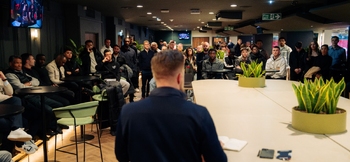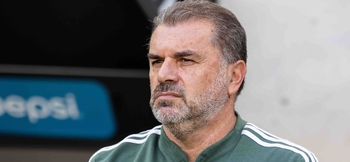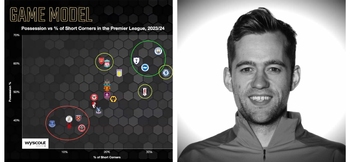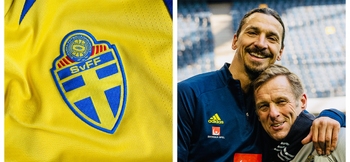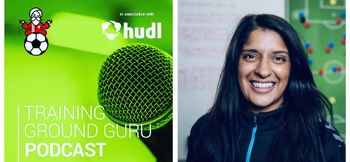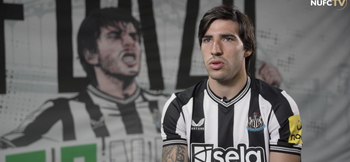Jeremy Bettle: Pushing performance in the NHL
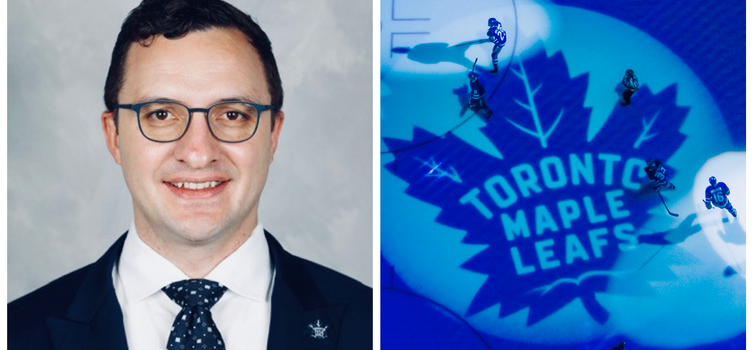
Bettle joined the Maple Leafs in June 2015
Written by Simon Austin — February 12, 2019
AS Head of Performance for the Toronto Maple Leafs ice hockey team, Dr Jeremy Bettle is responsible for the health and fitness of athletes at the second-most valuable franchise in the NHL.
That makes him one of the most senior English performance staff in the whole of world sport. We spoke to Bettle, a native of Leicester, about his job, his sport and the industry as a whole.
1. How did an Englishman become Head of Performance in the NHL?
I was born and raised in Leicester and did my undergraduate degree in Leeds from 1999 to 2002. After that I worked at David Lloyd Leisure and thought 'there has to be more to it than this'.
So in 2003 I came over to do my Masters and PhD in Nashville. I only intended to be in North America for a year but it just progressed and progressed. While I was doing my PhD I got a job with USA Rugby and worked with them through the 2007 Rugby World Cup.
Then I became Head Strength Coach with the University of California, Santa Barbara; moved onto a group called P3 (Peak Performance Project) and then became Head S&C with the New Jersey Nets. In June 2015 I moved to Toronto for this job. That’s all happened in the space of about 10 years, which is pretty crazy!
2. What does your job involve?
My full title is Director of Sport Science and Performance. I’m responsible for what we call our ‘off-ice programme’. That means everything that happens away from hockey, so overseeing medical, S&C, nutrition, psychology, rehab, scientific innovation and technology. It’s a really broad remit and it's been fantastic to come in and put a full system in place.
The ambition in getting the job was to get a good cohesive unit going, because it was tremendously silo’d in the NBA, where I worked previously, with the medical on one side and the S&C on the other. I think you need your strength coaches pushing your physios and vice versa, with me being almost a mediator.
The key is striking up conversations and challenging normal processes.
3. Does tech aid the process?
None of our tech makes decisions for us, but it does enable everyone to have access to all the data points and make better-informed decisions. This is why The Sports Office has been one of the key pieces we’ve added. It means all our data - GPS data, forceplates, strength measurements and so on - is together in one place and we don’t have to sift through 1,000 different spreadsheets to get it.
For every piece of technology we have that records something, we enter the data either directly or indirectly into The Sports Office. For example the guys' weights will load up automatically from the scale. It makes all our processes smoother and more systematic. Everything we need to is at our fingertips.
We’re also able to come in and check through the roster in the morning. If anyone needs to dig deeper, the info is there for everyone - they don’t have to ask the strength coach for his testing numbers or the medical guys for someone’s rehab programme.
That’s the key to this cohesive system we want. The physio needs to see what the players did in the weight room, our nutritionist needs to see where they are in their rehab and whether they need to add protein or carbs. If I’m on the phone with you, my guys need to be able to log in and see information and act on it.
Sports Office are constantly evolving, which is what we love about those guys. They’re always listening to the clubs and acting on feedback.
4. How do you decide what tech to bring in?
As I say, we don’t let tech make decisions for us - we use it to guide some of our processes. That’s where it’s been challenging and fun. We’ve tried to take as eclectic a view as possible and not just grab at anything that's new and shiny.
My job is to stick my head out of the window and see if there’s anything worth grabbing in. We probably have the resources to buy it all, which means we have to be careful to bring in the stuff that can be really impactful, like The Sports Office. I don’t want to collect data and measure stuff for the sake of it. I want to find a problem and work out how to get the right tool to measure and tackle it.
I’ve almost had to say 'one in, one out' with tests. Our athletes are only allowed in the building for a certain amount of time a day and most of that is going to be hockey. If they don’t see a computer all day, I think we’re doing our job quite well.
5. Why isn't the Head of Performance role more common in the English Premier League?
(Only five Premier League teams currently have the role - Arsenal, Everton, Manchester City, Manchester United and Southampton).
In the Premier League, so much of your fitness staff is connected to the Head Coach. If the Head Coach is only going to be there for 10 games, what do you need a Head of Performance for?
When a new Head Coach comes in, he’s likely to say ‘this is my fitness guy’ and install someone new. I can understand that, because the Head Coach has to have someone he trusts, he has to hit the ground running or he loses his job.
I was very fortunate to come in to a coach who was given an eight-year contract, which was quite unprecedented, even for US sport. I was able to have that security where he wasn’t going to bring in his own guy because he needed results straight away.
6. How difficult is it coming into a new sport?
It was a massive learning curve. I brought together a staff that was incredibly diverse in terms of skills and backgrounds and my mandate was, ‘we remain novices, we respect the culture and we don't act like we know better’.
So we asked tons of questions. We didn’t just do away with things because they didn’t fit our model. One thing I immediately liked was the culture of the players. They’re a very hard-working group and have generally had to work hard on conditioning and strength just to be here. The guys were open-minded no matter what was you put in front of them.
We can all be geniuses, but if the players don’t do it, it means nothing.
And the thing I experienced here that I hadn’t anywhere else was the level of support from the ownership, president, management and coaches. Their backing - along with that of the players - in that initial transition phase was crucial. Kyle (Dubas), who’s our General Manager, has been a fantastic breath of fresh air for the sport as a whole. He’s only 32 and is very tech and data savvy.
7. How do you condition the players?
I haven’t run a conditioning session in almost 10 years because we play a game four times a week. Our conditioning is playing hockey. We don’t run on-ice conditioning sessions. All our practices are done at game pace, at very high velocity and we actually don’t need to condition them. I’m a huge believer in tactical conditioning, because that’s what you’re trying to condition the players for. Off the ice, our job is to prepare them for those demands.
8. How does US sport science compare to UK sports science?
A lot of US sport is looking at the UK and thinking, ‘wow, they’ve really got it worked out from a sports science point of view’.
I go to a lot of conferences in Europe, where they talk about what the top soccer teams are doing, and a lot of their processes are very similar to ours in the US. It’s just that they’ve just been doing it for 10 years longer, so their data is more organised.
US sport is world-class in many aspects of S&C and in making strong, robust athletes. That’s something UK sport can learn from I think.
9. Have practitioners become preoccupied with injury prevention?
I don’t think there’s anything wrong with being obsessed with injury prevention - we most certainly are - but it doesn’t have to be at the expense of pushing performance. The two are going to go hand-in-hand. Your most robust, best-conditioned and highest-performing athletes tend to be the ones who have the fewest injuries. That comes from sensibly taking them from 1 to 100.
Strong athletes break down less. We can’t be afraid of making people really, really strong. The other thing that gets widely neglected is plyometric work, which is velocity-specific contraction. And spikes in load means every type of load. We can’t just train volume and neglect intensity; we can’t just look at strength and not speed of contraction.
We can't look at GPS numbers and say, 'right, they can’t practise today’, which I know does happen.
This is a hockey club, it isn’t a University sports science lab.
We work for the sport, so if we need to reduce their load we take them out of the lift, not off the ice. They need to be good at hockey. We’re defeating the object of what we’re here to do if we’re taking the players out of the skills sessions.
Similarly, if we’re worried about hurting guys in the gym so we stop doing squats then we’re not creating elite athletes any more. You see their load reduce, reduce, reduce, and then you ask them to perform in the play-offs and lo and behold they’re tearing groins. We’ve just got to take a more measured approach to injury prevention and pair it with performance enhancement.
The human body is amazingly resilient if you give it chance to be. It will adapt to what you put in front of it. You just have to give it chance to adapt.
10. How much sway does sports science have?
Just because you can measure something doesn’t mean that overrules a coach with 20 years’ experience. You can’t start saying the coach is wrong because the data says x or y. I think that’s wrong and arrogant. When a coach says the boys are tired, it means they’re probably tired. I’m very passionate about preserving that - it's incredibly important for us.
We have to respect it and really preserve it, using the data to complement the coaches and their experience. We’re putting the cart before the horse with sport science these days. It’s not why we’re here and it’s not what the fans are coming to watch. It’s very interesting and important but it’s not sport. If people say otherwise then they’re getting too caught up in themselves and their own importance in this.








